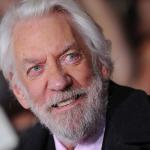RIP Donald Sutherland, a Hollywood Legend

There are some actors you can’t help loving. Not many, but the late Donald Sutherland was definitely one.
Sutherland wasn’t just a great actor, always interesting even in mediocre crap; he was one of ours, a lefty, with a period of intense anti–Vietnam War organizing to his credit. In the early 1970s, the start of the defining ten years of his stardom, he toured with Klute costar Jane Fonda in a traveling roadshow called FTA (Fuck the Army), which put them on the national security radar for years to come. FTA was a profane alternative to Bob Hope’s long-running USO show, meant to counter the rah-rah patriotism of the conservative Hope and his old-fashioned entertainment.
Still from The Hunger Games. (Lionsgate)
A documentary about the FTA group shows Sutherland reading from Dalton Trumbo’s harrowing antiwar book Johnny Got His Gun, which was made into a 1971 movie featuring Sutherland. Sutherland kept the faith after the counterculture struggle of the 1970s faded. He played the role of crusading Canadian communist Dr Norman Bethune twice, in Bethune (1977) and Bethune: The Making of a Hero (1990), both films celebrating this advocate for socialized medicine who served as a combat surgeon on the Republican side of the Spanish Civil War.
Becoming an actor in Scottish theater after giving up his university training to be an engineer, Sutherland first came to widespread prominence in Robert Aldrich’s The Dirty Dozen (1967), about twelve military convicts recruited to pull off a suicide mission against the Nazis in WWII, bringing his offbeat charm to the lanky goofball Vernon Pinkley. Robert Altman saw his performance and regarded it as an aptly irreverent audition for the lead role of wry prankster surgeon Hawkeye Pierce in M*A*S*H (1970).
Sutherland conveyed a kind of unlikely grit and could pull off heroics in a way that took all the triteness out of demonstrations of courage and determination. As the health inspector hero of Philip Kaufman’s Invasion of the Body Snatchers, he defines his character’s implacable nerve by the underlying delight he takes in confronting a French restaurateur trying to pass off rat turds as capers in a soup by holding up the unidentified object and barking, “If it’s a caper, then eat it.”
There’s something inspired about the way a scene like that can set you up for his character’s dogged struggle to escape the pod-people overrunning San Francisco, including scenes of rescuing the woman he loves (Brooke Adams) by breaking into her home and eluding her already-podded boyfriend by carrying her bodily out of the building. Despite his unconventional looks, you don’t doubt this guy would be the last man standing. And his pod-person takeover at the end, the famous much-memed moment when he points and screeches at a former friend is still so powerful because Sutherland made this character a kind of ultimate, incorruptible individual.
Still from Don’t Look Now. (Paramount Pictures)
His earlier scenes with Adams show Sutherland’s amazing attractiveness as a romantic lead. They’re supposed to be friends and work colleagues, but the way he leans just slightly in toward her when they stand together joking around, and infuses his grins with tenderness, conveys his unspoken love for her without sentimentality or cliché.
And given all this power, it’s surprising to read Sutherland’s own account of his essential nervousness as an actor that’s made him throw up before starting in almost any role, as he attests in a freewheeling exchange with Hugh Grant in Interview magazine:
SUTHERLAND: I’m nervous all the time. For me, the camera’s either a voyeur or a lover. If it’s your lover, it shares your soul. . . . If it’s a voyeur, it’s a fucking paparazzi.
GRANT: I know that Anthony Hopkins goes and strokes the camera every morning and says “Good morning” to it.
SUTHERLAND: I kiss the lens.
Sutherland then goes on to make Grant write down an Alexander Pope quote he feels describes him perfectly: “True wit is nature to advantage dressed, what oft was thought but ne’er so well expressed.”
In a late-life Esquire magazine piece, Sutherland contributed a series of statements about what he’d learned by his mid-seventies. The last ones are moving in the context of Sutherland’s death at age eighty-eight, and convey again those qualities that seemed inherently part of him onscreen. On the subject of death, he wrote with a kind of cool, cerebral insistence on looking at the reality of it:
The spirit of mankind is not going to help me through my death. My death is a lonely little journey that I’ll take myself.
And then he concluded with life-loving warmth:
You know Dalton Trumbo? He wrote Johnny Got His Gun. He was one of the blacklisted writers. Spent time in prison. Lost everything. Got everything back. Wonderful fellow. The last thing he said to me was “Don’t forget to be happy.”
So Sutherland’s gone on his lonely little journey, but it seems like he didn’t forget to be happy.
SHARE THIS ARTICLE
CONTRIBUTORS
Eileen Jones is a film critic at Jacobin, host of the Filmsuck podcast, and author of Filmsuck, USA.


